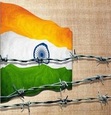Us vs. Them
I wrote this in my book over a year ago. It has become so relevant now.
An excerpt from my second book, Beyond The Milky Way.

“You mean to the region where the aliens — ,” Don caught himself before offending Tom, “your people live?”
“No,” Tom replied. “I mean different regions on this side.”
“Don’t you have countries? Borders?” Don asked.
“No. We don’t need them.”
“Why not?”
“As I said, people very rarely go to other regions.”
“It’s very different on our planet. Countries and borders are very well defined.”
“Tell me, has it worked?” Tom asked innocently. He already knew the answer. He was drawing Don out.
“Of course. Our nationality is our identity. It defines us. It separates us from the rest,” said Don proudly.
“And therein lies your problem,” he said.
“What problem?”
“Don’t you see? Without realizing it, you’re saying ‘them’ and ‘us’. Define ‘us’ and define ‘them’? Is ‘us’ something based on your nationality?”
“Yes.”
“So people from your planet are not one but different by country,” Tom continued.
“Yes.”
“So when does ‘us’ stop?”
“What do you mean?” replied Don.
“Let’s break it down. You have states within countries, right?”
“Right.”
“So, breaking them down further, you have cities within states and neighborhoods in cities. Are you with me?”
“So far, yes.”
“Good. Let’s continue. Houses in the neighborhoods, families living the houses, and some of them are joint-families.”
“Joint-families?”
“Families living together in one house.”
“Oh, right.”
“So when does ‘us’ stop?”
“Okay, you’ve lost me. I still don’t get it,” Don replied.
“Is ‘us’ as in your country and ‘them’ as in other countries, or ‘us’ as in your state and ‘them’ in other states?”
“Well…er…”
“But the states are in the same country,” Tom continued. “So, I ask you again, when does ‘us’ stop? ‘Us’ as in your country, ‘us’ as in your state or ‘us’ as in something else?”
“I see,” said Don, realizing what Tom was saying. He didn’t know what to say.
“And what happens if you move to another city or to another state?”
“Then I’ll be welcomed,” he replied. “We take care of our own.”
“’Take care of our own.’” Tom laughed sarcastically.
“What? Why are you laughing? What’s so funny?” Don asked.
“What’s ‘our own?’” Tom replied. “Is it religion, nationality? Or is it the human race? Is it gender, color of your skin? What is it?”
An excerpt from my second book, Beyond The Milky Way.

“You mean to the region where the aliens — ,” Don caught himself before offending Tom, “your people live?”
“No,” Tom replied. “I mean different regions on this side.”
“Don’t you have countries? Borders?” Don asked.
“No. We don’t need them.”
“Why not?”
“As I said, people very rarely go to other regions.”
“It’s very different on our planet. Countries and borders are very well defined.”
“Tell me, has it worked?” Tom asked innocently. He already knew the answer. He was drawing Don out.
“Of course. Our nationality is our identity. It defines us. It separates us from the rest,” said Don proudly.
“And therein lies your problem,” he said.
“What problem?”
“Don’t you see? Without realizing it, you’re saying ‘them’ and ‘us’. Define ‘us’ and define ‘them’? Is ‘us’ something based on your nationality?”
“Yes.”
“So people from your planet are not one but different by country,” Tom continued.
“Yes.”
“So when does ‘us’ stop?”
“What do you mean?” replied Don.
“Let’s break it down. You have states within countries, right?”
“Right.”
“So, breaking them down further, you have cities within states and neighborhoods in cities. Are you with me?”
“So far, yes.”
“Good. Let’s continue. Houses in the neighborhoods, families living the houses, and some of them are joint-families.”
“Joint-families?”
“Families living together in one house.”
“Oh, right.”
“So when does ‘us’ stop?”
“Okay, you’ve lost me. I still don’t get it,” Don replied.
“Is ‘us’ as in your country and ‘them’ as in other countries, or ‘us’ as in your state and ‘them’ in other states?”
“Well…er…”
“But the states are in the same country,” Tom continued. “So, I ask you again, when does ‘us’ stop? ‘Us’ as in your country, ‘us’ as in your state or ‘us’ as in something else?”
“I see,” said Don, realizing what Tom was saying. He didn’t know what to say.
“And what happens if you move to another city or to another state?”
“Then I’ll be welcomed,” he replied. “We take care of our own.”
“’Take care of our own.’” Tom laughed sarcastically.
“What? Why are you laughing? What’s so funny?” Don asked.
“What’s ‘our own?’” Tom replied. “Is it religion, nationality? Or is it the human race? Is it gender, color of your skin? What is it?”
Published on February 16, 2017 10:12
No comments have been added yet.
India Was One
- An Indian's profile
- 278 followers
An Indian isn't a Goodreads Author
(yet),
but they
do have a blog,
so here are some recent posts imported from
their feed.



